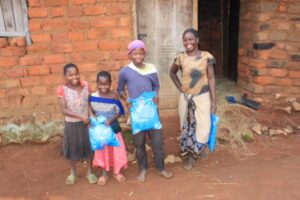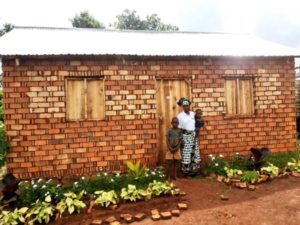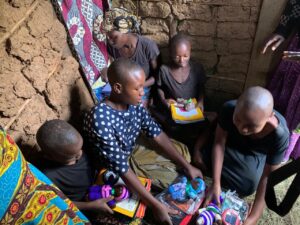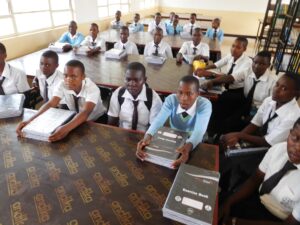In July 2020 the Tumaini charity working in Tanzania became an NGO with the name Tumaini Orphan Support Organisation (TOSO). The Organisation is currently operating within KAGERA, GEITA and KIGOMA Regions. Please look at their new website www.toso.or.tz
As Kagera is such a large geographic area to cover, Tumaini with generous donations from supporters has gradually established six offices in strategic locations:

Murgwanza Head Office
Muleba
Kayanga
Chato
Biharamulo and Kakonko
 The office managers report directly to Dr. Wilson. Each office is staffed by two social workers, an office attendant, a tailoring teacher, a carpentry teacher, an English and math teacher, and an accountant.
The office managers report directly to Dr. Wilson. Each office is staffed by two social workers, an office attendant, a tailoring teacher, a carpentry teacher, an English and math teacher, and an accountant.
There are about 400 Wahudumu (community workers), who provide services to the widows and orphans in the surrounding areas. They work in pairs, one male and one female, to oversee the Tumaini families and children in several villages. They are provided with a bicycle to enable them to visit families weekly, monitoring their health, school attendance and giving caring advice and assistance when needed.
They teach AIDS prevention and encourage all families to be tested. Tumaini provides bus fare for sufferers to access treatment, if treatment is available.
As it expands its work, Tumaini enters new areas, taking emergency help to those in severe difficulties, registering new orphans to Tumaini’s care. Mosquito nets are provided as seen in this photo. 
 Tumaini returns periodically to all villages to continually provide our registered orphans with new clothing, school supplies and mosquito nets. These are joyous occasions for the village, with families gathering and waiting patiently for hours in the sun to take their turn.
Tumaini returns periodically to all villages to continually provide our registered orphans with new clothing, school supplies and mosquito nets. These are joyous occasions for the village, with families gathering and waiting patiently for hours in the sun to take their turn.
WATER:  Most villages rely on a dirty pond for their water. Often located a long walk from the village, this pond is shared by both humans and wildlife, including crocodiles and venomous snakes. With this water used for cleaning and cooking, dysentery is common. In Tanzania 24,000 children under five years of age die each year from drinking dirty water.
Most villages rely on a dirty pond for their water. Often located a long walk from the village, this pond is shared by both humans and wildlife, including crocodiles and venomous snakes. With this water used for cleaning and cooking, dysentery is common. In Tanzania 24,000 children under five years of age die each year from drinking dirty water.
 Tumaini is enabling villages to access clean water for the first time. In the past 14 years Tumaini supporters have funded nearly 100 shallow & deep wells and protected springs, enabling villages to access clean water for the first time.
Tumaini is enabling villages to access clean water for the first time. In the past 14 years Tumaini supporters have funded nearly 100 shallow & deep wells and protected springs, enabling villages to access clean water for the first time.
 In 2018, generous Canadian donors funded 4 new wells in memory of family members, bringing fresh water to hundreds of grateful families in several districts.
In 2018, generous Canadian donors funded 4 new wells in memory of family members, bringing fresh water to hundreds of grateful families in several districts.
Tumaini Bringing Water
HOUSING:  Houses are traditionally built using easily available resources, usually wattle and daub, clay or dung. Roofs are grass or banana leaves and in the rainy season water pours into the house, soaking everything. They are usually just one room shared by the whole family for sleeping and cooking, which can create health and fire hazards.
Houses are traditionally built using easily available resources, usually wattle and daub, clay or dung. Roofs are grass or banana leaves and in the rainy season water pours into the house, soaking everything. They are usually just one room shared by the whole family for sleeping and cooking, which can create health and fire hazards.
Hundreds of new houses have been built by Tumaini since 2003, providing safe, healthy homes for desperate families. Newer homes now incorporate updates such as weather-resistant fired bricks, corrugated iron-sheet roofs, 3 internal rooms, wooden doors front and back for ventilation, mosquito screens and wood shutters on windows, made by trainee students in Tumaini Carpentry Schools. Cooking is done outside in a separate well-ventilated structure protected from the elements.
Now see this lovely new home built with funds donated to Tumaini. 
EDUCATION:
Primary schooling is free in Tanzania, but children cannot enroll unless they have school uniforms, books and pencils, which prices education out of reach for most subsistence farmers’ children and is an impossibility for AIDS widows’ families and child-headed families.
 Each child registered by Tumaini receives a welcome package of 2 sets of clothing, school uniform, books and pencils and a mosquito net. The new clothes enable the child to re-enter society, the school supplies enable entry to primary school and the mosquito net protects them from malaria. Children are also offered a Children’s Bible “Biblia kwa satoto” donated by the Bible Society.
Each child registered by Tumaini receives a welcome package of 2 sets of clothing, school uniform, books and pencils and a mosquito net. The new clothes enable the child to re-enter society, the school supplies enable entry to primary school and the mosquito net protects them from malaria. Children are also offered a Children’s Bible “Biblia kwa satoto” donated by the Bible Society.
Solar lamps are a wonderful help. 
Secondary Schools: Children who pass the final primary school exams can attend government secondary schools; however, many cannot afford the costs for uniforms and school supplies. Tumaini helps by supplying as many as possible with the Government mandated 10 hard-backed exercise books, called Daftari, pens, pencils, school uniform, shoes and a school bag.
Whenever possible Tumaini also provides bicycles which reduce the long walks to and from school and solar lamps to enable homework at night after chores of food production and animals are done. 
For an orphan graduating secondary school with a First Division pass, Tumaini encourages continued education with A-levels, College and University courses.
College Courses are for two years, training students for careers in teaching, dispensary, accountancy, administration, social work, agriculture, laboratory work, tourism and community development. 
University allows very bright students to study for degrees in Law, Psychology, Medicine, etc.
 Adult Education: Tumaini has set up several Vocational Schools across Kagera, currently teaching tailoring and carpentry.
Adult Education: Tumaini has set up several Vocational Schools across Kagera, currently teaching tailoring and carpentry.
Micro-financing is available for adults and families wishing to change from subsistence farming.
A loan programme has been established to assist the new businesses. Projects include improving their agricultural yields, setting up businesses such as goat husbandry, rearing chickens and cows, bee keeping and fish ponds.
Goat projects are very popular with widows with young families – milk boosts the nutrition/diet for their children and the widows can breed the goats again and have more kid goats to sell. Child HIV transmission is reduced by enabling HIV infected mothers to ween their babies off breast milk onto goat’s milk while the infants are young, before their teeth come through.
 Bee keeping is being funded as an important industry. Honey can be harvested for families to eat and sell to generate income. The bees pollinate sunflower crops which are crushed to make oil for cooking and to sell. Local clinics can use honey to dress burns and open wounds.
Bee keeping is being funded as an important industry. Honey can be harvested for families to eat and sell to generate income. The bees pollinate sunflower crops which are crushed to make oil for cooking and to sell. Local clinics can use honey to dress burns and open wounds.
GROWTH:
Since its founding in Guernsey in 2003, word has spread about the desperate need of so many in Kagera. Tumaini has grown and increased its support worldwide.
Charities have been registered in Guernsey, USA, Canada, England, and Scotland. Support has expanded to Ireland, Norway, Wales, Shetland Iles, New Zealand and Australia.
Tumaini is a faith based charity and supported by many churches of all denominations in countries around the world, with thousands of volunteers freely donating their time and talents to support this vital work. “Religion that God our Father accepts as pure and faultless is this: to look after orphans and widows in their distress and to keep oneself from being polluted by the world” James 1:27


